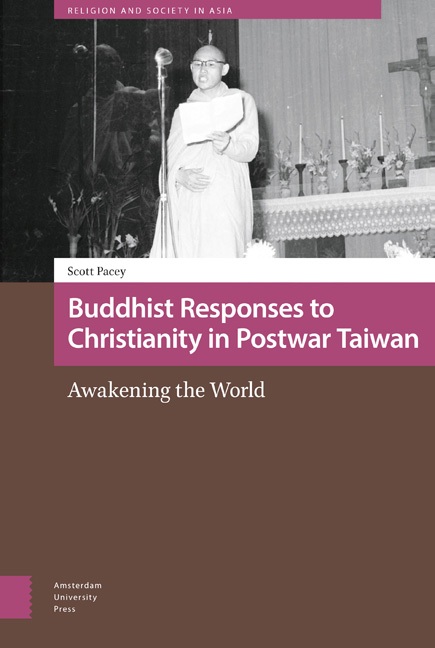Book contents
Summary
In the 1950s and 1960s, Christianity was rapidly expanding in Taiwan—so much so that in 1961, the senior presidential advisor Hollington Tong (1887- 1971) proclaimed that “at the present rate of conversion, Taiwan is destined to become a Christian island in less than half a century.” While Tong may have been trying to shore up support for the island's ruling party, the KMT, by appealing to American Christians, shortly after making his prediction Christian growth plateaued. Today, Taiwan is not a “Christian island” at all. In fact, according to the 2015 Taiwan Social Change Survey, Christians have instead made more modest gains; only 4.5% and 1.5% of respondents were Protestants and Catholics respectively. By way of contrast, Buddhists comprised 19.9%—and Daoists 16.6%—of the population; adherents of folk religion (35.5%) were even more numerous.
But when Tong was writing his book, the situation was quite different. In 1945, Taiwan was returned to China after half a century spent in the Japanese Empire; then, there were only 8-10,000 Catholics and 60,000 Protestants on the island.3 But by the early 1960s, it was home to 300,000 Catholics and 280,000 Protestants. In addition, Christians sat atop Taiwan's political pantheon. This included the “Father of the Nation” (Guofu), Sun Yat-sen (1866-1925), who in 1912 became the ROC's Provisional President after the overthrow of the Qing dynasty (1644-1911), and the “generalissimo” Chiang Kai-shek (1887-1975)—who ruled Taiwan as President of the ROC after losing the mainland to the Communists in China's civil war, in 1949. Hundreds of foreign missionaries were active on the island as well.
As we will see, this expanding Christian presence was particularly challenging to a vocal and influential group of Buddhists. It led them to issue stern critiques of Christianity, because they considered the rise of Protestantism and Catholicism to pose an existential threat—one that complemented Communism in mainland China. This is because after 1949 in the PRC, Buddhists (and other religious practitioners, including Christians) were faced with severe limitations on their religious freedom. Following more than a decade of repressive policies, during China's Cultural Revolution (1966-1976), the Red Guards (Hong Weibing) decimated the country's religious infrastructure, and religious practice itself was driven underground. Across the Taiwan Strait, a perusal of Buddhist publications reveals a general anxiety about the long-term viability of their tradition—with both Christianity and Communism mentioned as threats.
- Type
- Chapter
- Information
- Buddhist Responses to Christianity in Postwar TaiwanAwakening the World, pp. 11 - 16Publisher: Amsterdam University PressPrint publication year: 2019



